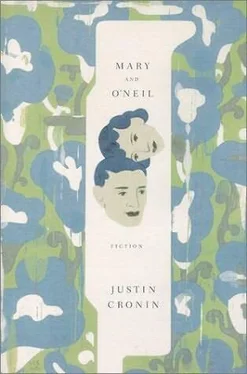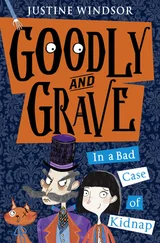O’Neil has climbed for ten minutes when the road levels and gives onto a grassy clearing with a view to the north and behind him, higher up, a field in which a herd of sheep dreamily graze. O’Neil stops and stands with his back to the field, resting his hand on a smoothly weathered fence post. Below him he can see his hotel and the town of Southwich, its grid of streets and houses and shops, and his heart expands at the sight of this happy and attractive place that exists for no reason. To the west he finds the main road where it follows the lake, a shimmering expanse two miles away, and beyond it the great sullen peaks of the Adirondacks, now socked in heavy haze. Again O’Neil looks east, toward his sister’s house, and counts seven lines of clouds drifting almost imperceptibly toward him in the lazy air. Far off, a curtain of rain falls into the hills.
It is here, alone with the town laid out below him, that O’Neil allows himself to think about his parents and remember the accident that killed them twelve years ago. This is why he has come. He does not believe in heaven, or the existence of consciousness after death, but he knows that his awareness of them is never far, like a ghost that travels beside him, always at the edge of his vision; and that when he wishes to feel close to them, as he does today, he can bring this awareness into focus, briefly, in a picture. He closes his eyes and lets his mind range. The image he selects is from his sister’s wedding, a year before the accident: his father in his tuxedo, standing on a chair to toast the gathering; his mother laughing, her head thrown back in release, her face opening with pleasure at the wit of the toast O’Neil can no longer hear. There is my father, he thinks, my father, toasting. There is my mother in her blue dress. He holds the picture in his mind as long as he can, until the colors blend and shift, the signal breaks up like a radio station gone out of range, and what remains is only a spidery light that dances against the interior of his closed eyes and the memory that they are dead. Then he says a prayer against the rain and heads down the hill.
Stephen is asleep at the bottom, and together they walk back to the hotel. By the time they return it is after ten. Mary’s parents are finishing breakfast in the dining room, and before O’Neil can hurry up the stairs they see him and wave him over. They are dressed for the wedding, and O’Neil, in his damp T-shirt and shorts, stands awkwardly by their table and eats a cinnamon roll while they talk about the weather. If it looks like rain, Gretchen wants to know, will they still hike up to the meadow? She hopes he’ll say no-Mary’s family has been a little uncomfortable with the plan all along-but he says he’s not sure; he’ll have to talk to Mary. Probably, he says, if it looks like rain but isn’t actually raining, they will go ahead with it.
O’Neil finishes his roll, takes another off the table to eat later in his room, and excuses himself to meet his friends and dress. He has nearly crossed the lobby when the manager stops him and hands him the phone: his sister.
“What about the weather?” she asks.
O’Neil rubs his eyes. He is exhausted by the question, and doesn’t want to make any more decisions. Guests are beginning to come downstairs. He really needs to go get ready. He tells his sister he doesn’t know.
“Well, it’s raining over here. It was raining, anyway. I don’t see how the old folks are going to make it up the path.” There is a scratching noise on the line, and O’Neil’s sister’s voice drifts away. “Stop it, Noah. Here, play with this.” Then she returns. “O’Neil? Sorry, he’s fussing. The caterer is here too. I think she wants to talk to you about the chairs. If it’s raining we’ll need to put some under the tent.”
“That’s all right.” O’Neil thinks for a minute. What is it he needs? He looks up to see their friends, Russell and Laurie and their young son, Adam, coming down the stairs, the three of them wearing rubber boots and Russell swinging a folded umbrella like a putter. They laugh when they see him still in his running shorts with his wedding an hour away, as if this is typical in some way, which O’Neil knows is certainly true. He is late for almost everything: the last one dressed, the last car in the drive, the last to turn in his grades; except for Stephen, he is the last to marry. “Listen, Kay,” he says.
“Jack, can you do something with him, please?” There is a shuffle as Kay hands his youngest nephew off. “What’s that, hon?”
“I’m stumped. I can’t think anymore. I’m not even dressed.” O’Neil knows she understands what he is really asking; just to let things slide until he gets there, and if there’s anything left to decide, he’ll do it then, or let the momentum of the day force the last pieces into place. “I think I need some ad hoc parenting here,” O’Neil says.
“Steady, kid,” Kay says. Several moments pass. More guests are coming down the stairs, waving to him and shaking their heads at his dishevelment, and O’Neil wants to leave the lobby very badly.
“Okay, how about this,” Kay says at last. “No comment on the weather, the caterer can do whatever she wants with the chairs, and anybody who wants to mess with the groom has to go through me. All right?”
Relief washes over him. “I love you. I mean, you’re my only living relative, but even so.”
“Ditto. Don’t go bugging Mary. I know that’s what you want to do, but that bad-luck stuff is nothing to fool with. Jack didn’t see me, and so far so good.”
O’Neil hangs up, asks the hotel manager please not to give him any more calls, and heads to the kitchen to see if he can scare up a tray of tea and rolls for Mary. His plan is to place it beside her door, knock, and quickly retreat. He believes he has forgotten something, some detail like the caterer’s chairs, but he cannot recall what it might be, and he is just as glad to bring Mary some breakfast and let things take care of themselves. The kitchen is empty, but O’Neil looks around and finds Alice, the woman who tended bar the night before, reading the newspaper in the crowded pantry. Breakfast is over, she says, but she is sure she can put something together.
“So, are you nervous?” she asks, pouring Mary’s tea. She has a pleasant face, with the soft, butterscotchy tan of someone who spends a great deal of time outdoors in all weather. Her blond hair is tied in a thick Teutonic braid that falls the length of her back, the end just touching the top of her jeans. “You don’t look nervous.” She laughs, showing the lines of her eyes. It is a laugh that says that she, too, is married, that it happens to everyone.
“I don’t know,” O’Neil says. “I think maybe I’m just getting used to it.”
“Well, don’t be.” She hands him the tray. On it she has placed, beside the basket of muffins and the mug of tea, a thin glass vase holding a single yellow rose. She wipes her hands on her apron. “Take my word for it. It’s the happiest day of your life. You’ll see.”
“Is it?” O’Neil, holding the tray against his stomach and looking at the rose, feels a tightness in his cheeks and suddenly knows he is about to fall apart. He cannot account for this, because as far as he knows he isn’t nervous, or sad, or even especially happy, though what he feels seems related to happiness. It is as if he is suddenly inside his own emotions, so far inside them that he may have neglected to breathe, and he rests the tray on the counter and inhales deeply through his nose. He notices Alice has left the room. Then she returns, dragging a wooden chair from the pantry.
“Here,” she says, and slides the chair under him. “You rest a minute.”
O’Neil does as she says, and Alice hands him Mary’s tea. He takes a small sip, letting the cup hang under his face to feel the sweet steam on his cheeks. The cup is like a warm, smooth stone in his hand, and he realizes he is shivering.
Читать дальше












